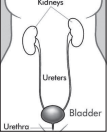Download and print as a PDF (327kB pdf)
On this page
My child has a urinary tract infection (UTI)?
Your child has been diagnosed with a urinary tract infection (UTI), which is an infection of the bladder, kidneys or the tubes that connect them. UTIs are usually caused by bacteria and are common, especially in young babies and girls. UTI’s are usually treated with antibiotics.

How is a UTI diagnosed?
You might have noticed that your child has had any of these common UTI symptoms: fever, poor feeding, vomiting, tummy pain, refusing to pass urine, or blood in the urine.
Older children may also complain of pain when they pass urine, back pain, and / or they may pass urine more frequently or more urgently than usual.
A positive ‘dipstick’ test on a urine sample is highly suggestive of a UTI. If your child’s dipstick test is positive, the urine sample will be sent to the microbiology laboratory for further testing. If your child’s urine sample grows bacteria, we will know for sure that your child has a UTI.
What is the treatment for UTI?
It will take a couple of days to receive the results of the microbiology test so we will usually start antibiotics straight away. The antibiotic course usually lasts for 3 days but may be up to 7 to 10 days if we think your child has an infection in their kidneys, which can be more severe than a bladder infection.
Most children with a UTI can be managed with oral antibiotics, plenty of fluids, and medicine for their pain and fever. If your child has a more severe infection or if they are under 3 months of age, they may need to be admitted to hospital to receive antibiotics directly into a vein (intravenous). Your doctor or nurse practitioner will discuss this with you after the dipstick test results are back.
What happens next?
Once the results of the microbiology test come back, your child’s antibiotics may be continued, stopped, or changed, depending on what the sample grows. We will usually contact you to let you know if a change is needed.
Sometimes the sample grows a mixture of bacteria (‘mixed growth’). This is usually when the urine has been accidentally contaminated by skin bacteria, such as if the collection pot comes in to contact with skin.
We don’t usually need to do anything with mixed growths unless your child is a young baby, in which case we will contact you and ask for your child’s sample to be repeated through your GP.
When should I seek further help for my child?
If your child:
• Is unable to take their antibiotics or not keeping them down.
• Seems dehydrated (dry mouth, sunken eyes, or passing less urine than normal).
• Complains of pain in the back.
• Has uncontrollable shakes.
• Seems to be getting worse or is not responding to antibiotics after 2 days.
• Is under 3 months old with a fever (temperature above 38°C).
• Has a fever (above 38.0°C) for more than 5 days.
Your child should see a nurse or doctor today. Please ring your child’s GP, call NHS 111, or bring them back to the CED if that is what you have been advised.
If your child:
• Becomes pale or mottled.
• Becomes irritable (crying inconsolably despite distraction), confused or very lethargic (difficult to wake).
• Has blue lips or pauses in their breathing (apnoeas) or has an irregular breathing pattern.
• Develops a rash that does not disappear with pressure (the ‘Glass Test’).
Phone 999 for an ambulance or go straight to the nearest Emergency Department.
Does my child need any other tests?
If your child is under 6 months of age, if they have repeated UTIs, or UTIs caused by unusual bacteria, they will need an ultrasound scan of their urinary tract. This is a type of scan that looks for any problems with your child’s kidneys that may make them prone to have UTIs, or for any evidence of past damage to their kidneys from previous infections. If your child needs an ultrasound scan we will usually contact you to arrange this once the microbiology test results come back. If you think that your child needs a scan but haven’t heard from us, please go back to your GP to discuss.
NHS advice on causes and preventing urinary tract infections.
Useful resources / numbers
Practice Plus (Brighton walk-in centre / GP service)
Open every day including bank holidays.
8:00 am to 8:00 pm
For out of hours GP service or advice
Royal Alexandra Children’s Hospital Children’s Emergency Department
Please be aware that CED staff will not be able to give you medical advice for your child over the phone but can direct you to an appropriate service to assist with your enquiry.
01273 696955
Ext. 62593
This leaflet is intended for patients receiving care in Brighton & Hove or Haywards Heath.
The information in this leaflet is for guidance purposes only and is in no way intended to replace professional clinical advice by a qualified practitioner.